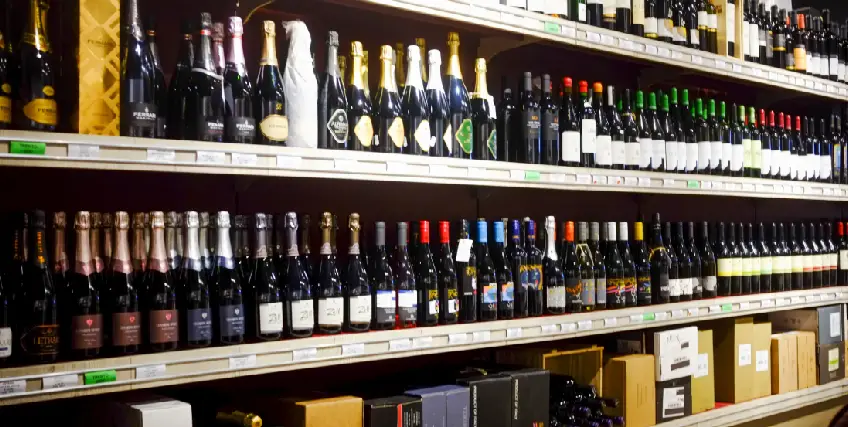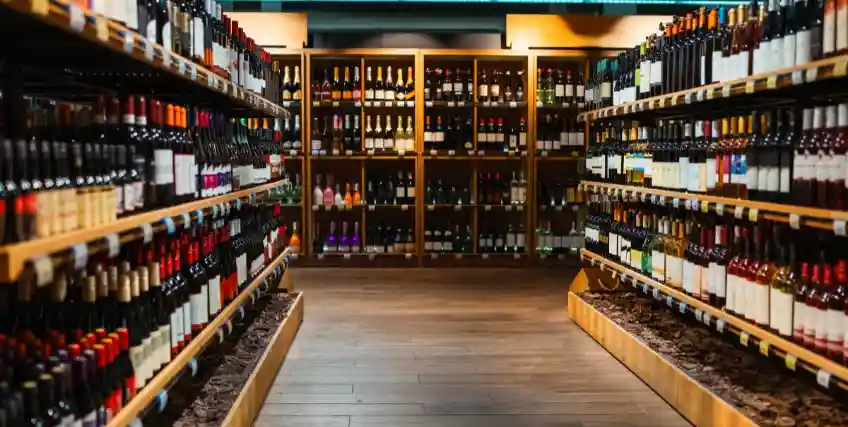Looking for Business Financing?
Apply now for flexible business financing. Biz2Credit offers term loans, revenue-based financing, lines of credit, and commercial real estate loans to qualified businesses.
Set up a Biz2Credit account and apply for business financing.
Key Takeaways:
Explore the popular financing options for liquor store businesses.
Understand the differences in startup funding and expansion funding for liquor store loans
Know the regulatory factors affecting liquor store loans
Learn about the lender requirements and metrics for liquor store loan approval
Get insights on costs of running and financing liquor stores and tips to buy liquor stores.
Liquor stores play a steady role in the U.S. retail economy. According to the U.S. Census Bureau's Annual Retail Trade Survey, beer, wine, and liquor stores have generated billions in sales across the country, reflecting stable growth in this retail category. This steady demand attracts many entrepreneurs interested in owning a liquor store, expanding an existing liquor store business, or looking for a liquor store to buy.
However, entering or growing in this industry requires significant financial preparation. A small business loan can help manage these costs. But financing liquor stores works differently than financing other retail businesses because lenders consider additional regulatory, licensing, and compliance factors during underwriting. Understanding these factors helps borrowers make informed decisions when exploring liquor store financing.
In this article, explore popular funding options for liquor stores and tips to strengthen loan application. Learn about lender expectations, approval odds, and regulatory considerations unique to the liquor store business.
Types of Small Business Loans for Liquor Stores
There are several choices of financing based on business goals and what it is eligible for. Various types of financing options tend to have quite different terms with regard to repayment, underwriting and interest rates.
SBA Loans
Maximum loan amount is up to $5 million.
Funds may be used for commercial real estate, working capital, and business acquisition.
Liquor stores often use this program when they want to buy liquor store businesses.
Funds may be used for commercial real estate, heavy equipment, and renovations.
Useful when liquor store business owners want to purchase a building or expand a location.
SBA states 504 loans may go up to $5.5 million for eligible projects.
Traditional Bank Loans
Annual revenue
Profit margins
Cash flow stability
Credit score
Compliance with liquor regulations
Online Small Business Loans & Alternative Financing
Quick application and funding decision.
Higher interest rates.
Suitable for urgent expenses.
Equipment Financing
Loans for Business Acquisition
The Small Business Administration (SBA) does not offer loans directly. They rather guarantee loans provided by approved SBA lenders. The SBA loans can be used for buying an existing liquor store, refinancing debt, purchasing equipment, or expanding a retail business.
SBA 7(a) Loan Program
SBA 504 Loan Program
SBA Microloan Program
The SBA Microloan Program provides funding up to $50,000 for smaller funding needs. It can be used to help finance inventory, shelving, a POS and small renovation costs.
SBA loans require an in-depth application, including the submission of a business plan, financials, and tax returns. The underwriting process for SBA loans is more rigorous than that of online loans with short terms, but typically SBA loans have better terms.
A traditional bank may offer term loans or a business line of credit for liquor stores. Banks typically evaluate:
Banks tend to prefer existing liquor store businesses with strong financial history. The interest rates may be competitive, but the approval standards can be tough.
For business owners looking for capital assistance with liquor retailing in their communities, digital lenders may often provide a higher degree of convenience and access to quicker funding decisions than traditional banks.
Short-term Loans
Working Capital Loans
Working capital loans can help liquor retailers offset fluctuations in cash flow on a month-to-month basis or seasonally.
Business Line of Credit
A business line of credit is a revolving credit option that provides ongoing access to funds to assist the owners in covering business expenses like inventory purchases and emergency expenses.
Liquor stores typically use specialized equipment like coolers, refrigerators, shelves, and security systems. Equipment financing provides these businesses with a means of financing those purchases. In addition, the equipment itself is often used as collateral for this type of loan.
Business owners may find equipment financing attractive because it offers predictable monthly payments and structured repayment terms.
When entrepreneurs want to buy liquor store businesses, some lenders offer acquisition-specific funding.
Lenders generally evaluate:
Acquisition Price
Financial Performance of the Business
Current Liquor License Status
Valuation of Inventory Lease Terms
Startup Funding vs. Expansion Funding for Liquor Stores
Startup Funding
Starting a new liquor store requires significant upfront investment to manage initial business finances. Funds may cover:
Licensing fees
Store renovations
Security systems
Lease deposits
Initial inventory
Insurance requirements
Staffing
New liquor stores must show strong business plans to improve their approval odds because they lack financial history. Liquor license approvals can take time, which lenders generally factor into underwriting decisions.
Expansion Funding
Financing expansion is common among stable liquor stores with proven revenue. Existing liquor store owners may seek a liquor store loan for:
Adding new product categories
Opening a new location
Expanding commercial real estate footprint
Renovations
Acquiring new equipment
Increasing inventory before holidays
Regulatory Factors That Affect Liquor Store Loans
The liquor retail sector is one of the most highly regulated areas of business in the United States. Liquor store loan approvals are greatly influenced by both federal and state regulations.
Federal Licensing: Requirements of the TTB
State Alcohol Licensing
Compliance History
Violations
Age restriction issues
Tax compliance problems
Zoning and Location Limits
Liquor stores are regulated by the Alcohol and Tobacco Tax and Trade Bureau (TTB). The TTB is responsible for enforcing alcohol laws and regulating the manufacture, import, and distribution of alcohol within the United States.
Although liquor stores must comply with state law for alcohol sales, they must also follow the federal alcohol labeling and tax rules set out by the TTB. The TTB does not provide distinct federal retail liquor store licenses but requires all retail liquor stores to complete the Alcohol Dealer Registration (Form TTB 5630.5d) before they can legally operate.
When evaluating a liquor store for a loan, it is common for lenders to check that the business has an active TTB registration, particularly when the business plans to obtain the additional federal alcohol permits needed to engage in importing or wholesaling alcoholic beverages.
There are state agencies with jurisdiction over liquor licensing in every state.
The California Department of Alcoholic Beverage Control, for instance, oversees the licensing of liquor stores in California. The Texas Alcoholic Beverage Commission also issues licenses to liquor stores through sophisticated retail permit criteria.
These state agencies examine the applicant's qualifications for a retail liquor license, the applicant's compliance history, and whether the applicant is legally doing business. Lenders typically demand evidence of current retail liquor licensing before providing financing to a retail liquor store.
Lenders may review whether a store has:
A clean record helps borrowers during the loan application.
Many states and municipalities have specific regulations regarding a liquor store's location density or its proximity to schools, places of worship, and other locations deemed "sensitive." This can affect the choice of where to locate a liquor store, as well as how lenders assess a potential borrower's creditworthiness.
Eligibility Criteria for Liquor Store Loans
A lender may have specific criteria that must be met in order for a business to qualify for financing. For instance, SBA lenders follow the SBA eligibility guidelines. While lenders will have their own requirements, there are similar requirements across the board. These include:
A good credit score
Consistent cash flow and profitability
Solid financial statements
A valid liquor license
An acceptable amount of annual revenue
A comprehensive business plan
The amount of a down payment and/ or collateral
A clean history of filing taxes
How to Improve Approval Odds for Liquor Store Loans?
Liquor store owners can improve their chances of obtaining a small business loan by following a few steps.
Build a Strong Business Plan
A business plan should include:
Market demand
Pricing strategy
Revenue projections
Inventory management plan
Competition analysis
Regulatory compliance plan
Strengthen Financial Documentation
Organize tax returns
Update financial statements
Track daily sales accurately
Maintain updated bookkeeping
Improve Credit Profile
A stronger credit score increases approval chances and may lower interest rates.
Maintain Clean Licensing Records
Compliance violations reduce lender confidence. Ensure all licensing requirements are up to date.
Show Experience in Retail or Owning a Liquor Store
Experience reassures lenders that borrowers can manage a regulated retail business.
Costs of Running and Financing Liquor Stores
Running liquor stores involves several operational expenses.
Licensing Costs - State licensing fees vary widely. For example, California ABC's fee schedule outlines license types and associated costs.
Equipment Costs - Business owners generally finance equipment like refrigerators, POS systems, shelving, and signage through equipment loans.
Inventory Costs - Inventory is one of the largest expenses as liquor stores must maintain diverse products to stay competitive.
Insurance - Alcohol retail requires higher liability coverage.
Tips to Buy a Liquor Store
When considering the purchase of a liquor store, an entrepreneur should:
Review all financial statements for the previous three years
Verify the history of compliance and licensing
Evaluate lease terms from a tenant's perspective
Understand the current inventory condition and quality
Determine how revenues fluctuate throughout the year (i.e. seasonal) and what impact this has on future sales
Verify whether liquor licenses will be transferable (this differs by state).
When seeking to purchase a liquor store, individuals should seek out multiple liquor stores with similar revenue sources to evaluate comparison pricing relative to stability in their respective local markets.
Conclusion
Entrepreneurs attracted to liquor stores appreciate the dependability of an always-growing customer base. However, liquor store owners must plan ahead to make their business grow through sound financing and understanding their loan options, requirements, and compliance issues.
If you are applying for an SBA Loan, a bank loan or some other type of financing, it is crucial to remain prepared and adhere to the best practices of maintaining compliance. This will increase the trust level of lenders regarding your liquor store and ultimately aid in the growth of your retail liquor store.
FAQs About Small Business Loans for Liquor Stores
1. Are liquor stores eligible for SBA loans?
SBA loan programs such as 7(a), 504, and Microloans support liquor stores as long as they comply with federal and state licensing rules. Business owners must go through the general SBA eligibility guidelines to understand the terms and conditions.
2. Can I get a loan to buy a liquor store?
Business acquisition loans, especially SBA 7(a) loans, are commonly used when borrowers want to buy liquor store businesses.
3. What credit score do I need for a liquor store loan?
Lenders typically expect a strong credit profile. Each lender sets its own credit score criteria, but a higher score improves approval odds and may reduce interest rates.
4. Do liquor store loans require collateral?
Many lenders require collateral such as inventory, equipment, or commercial real estate. SBA loans may also require personal guarantees.
5. How long does it take to get a liquor store loan?
Approval times vary by lender. Traditional bank loans and SBA loans may take longer due to detailed underwriting. Online lenders generally offer quicker funding decisions.




